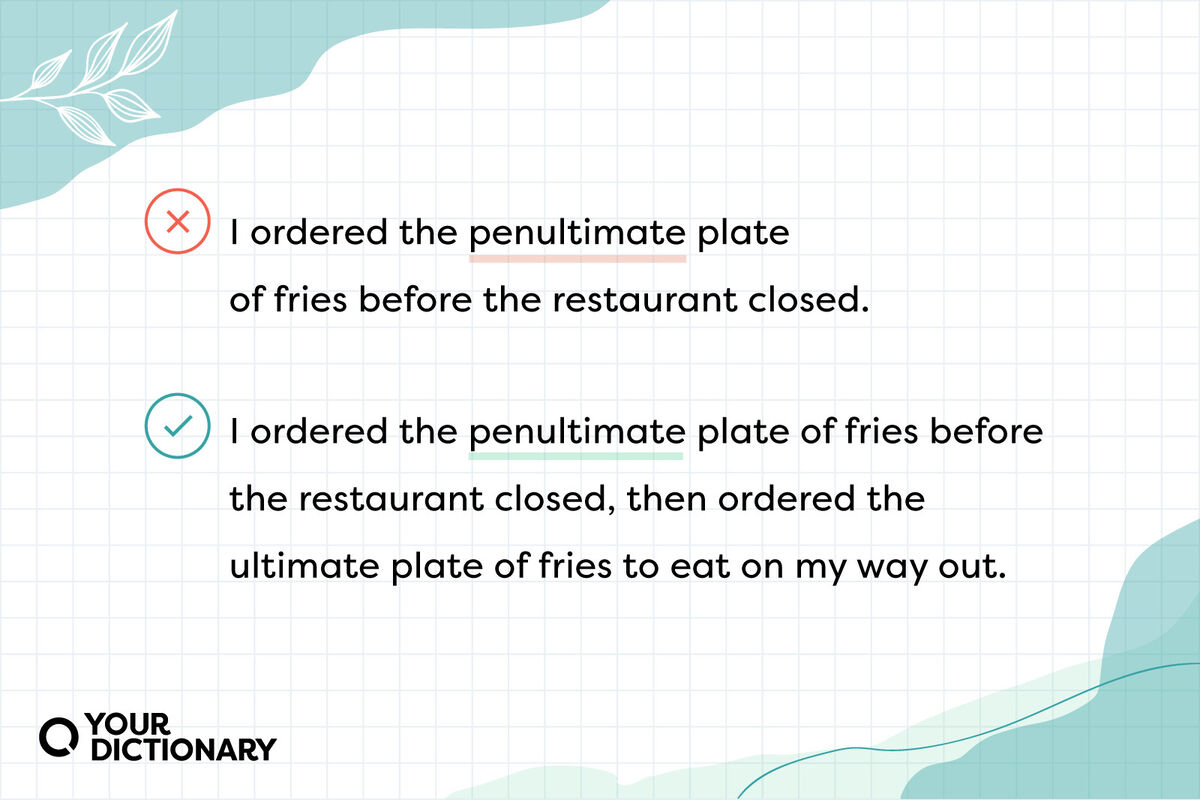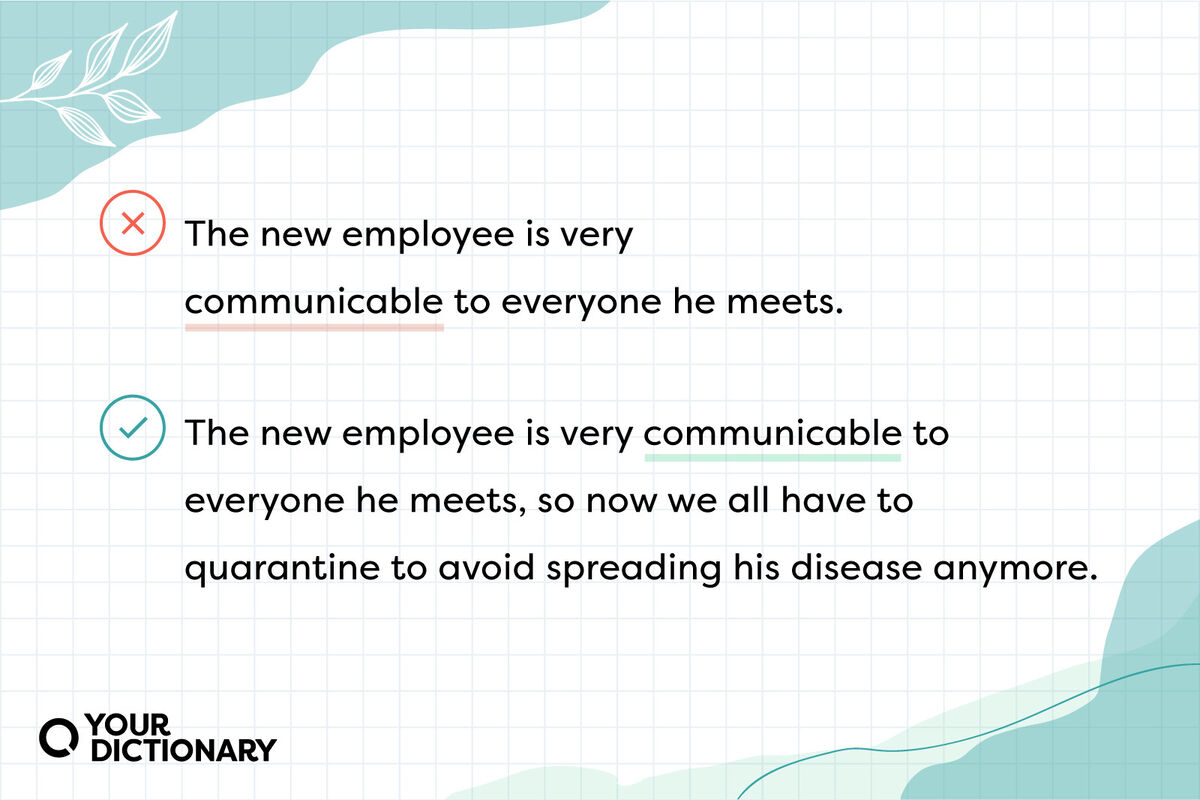
If you've ever used the word penultimate to describe the very last item in a series or collection, it probably felt pretty great. It's a much fancier word than ultimate, after all, and it's a lot of fun to sprinkle into conversation. But here's the bad news: That's not what penultimate means. You used it wrong — and even worse, there are plenty of other common-but-fancy (and some just common) words that you're probably using incorrectly as well.
Penultimate: Saving the Best for (Not) Last
Penultimate doesn't mean "last" — it means "second to last." It's the 19th chapter of a 20-chapter book, or the third act of a four-act play, or the seventh puppy you swore was your last puppy until you saw your eighth puppy. Ultimate is the word to use when describing the final part of a series (or when describing something as the best or highest challenge, such as "Ultimate Frisbee"). Once you learn to use penultimate correctly, you can really impress your friends with antepenultimate, which means "third from last"!
-
Wrong: I ordered the penultimate plate of fries before the restaurant closed.
-
Right: I ordered the penultimate plate of fries before the restaurant closed, then ordered the ultimate plate of fries to eat on my way out.
Utilize: You’re Utilizing It Wrong (and That Was Wrong Too)
Adding the suffix -ize to a word automatically makes it look fancier. And utilize is a nice, three-syllable word that essentially means the same thing as use — so why not throw that bad boy into your writing? The problem is, utilize has a much more specific meaning than use. It means “to use an item beyond its intended purpose.” You use a fork to eat; you utilize a fork to pick a lock when the zombies are right behind you.
-
Wrong: Let’s utilize this time to brainstorm a better solution to the zombie problem.
-
Right: Let’s utilize this car engine to electrify the fence as a solution to the zombie problem.
Obliged: Don’t Make Me Thank You
Obliged and obligated sound similar enough to be the same word, so most people use them interchangeably. But unfortunately, that's not how English works. Obliged means "in one's debt" and involves a sense of gratitude and returning a favor, while obligated means "compelled to do something" and doesn't usually involve any gratitude at all.
-
Wrong: After learning the parade float wasn't a real dragon only after burning it down, Oliver was obliged to help rebuild it.
-
Right: "After I save the town from this dangerous dragon," Oliver thought, eyeing the beast before him, "the entire town will be obliged to thank me."
Bemused: Not Not-Amused
Writers sometimes depict mothers of naughty children as shaking their heads with a bemused smile. They're annoyed, but also amused. Unfortunately, that's the incorrect use of bemused, which actually means "confused or bewildered."
-
Wrong: Martha's face slipped into a bemused expression as the children ran wild in the grocery store. "Kids," she sighed.
-
Right: Martha's face slipped into a bemused expression as the children ran wild in the grocery store. "Whose kids are these?" she asked. "Where am I? How did I get to the grocery store?"
Weary: Describe Your Irritation Correctly
There's one correct way to use weary: to mean "tired." You can be physically weary ("He was weary after a long day's work") or emotionally tired ("I'm weary of your complaining"). However, it does not mean "nervous or cautious" — use the similar-sounding words leery or wary for that.
-
Wrong: Ever since the mayor warned us about werewolf sightings, I've been weary about walking alone during a full moon.
-
Right: We're all getting weary of the mayor's obsession with werewolves
Poisonous: Not For Scary Things That Will Sting You
Have you ever described a dangerous snake or spider as poisonous? Your intentions are good, but your vocabulary is wrong. Remember: if you bite it and you die, it's poisonous. If it bites you and you die, it's venomous.
-
Wrong: Don't let that scorpion sting you. It might be poisonous.
-
Right: Don't eat that scorpion. It might be poisonous.
Disinterested: Not as Boring as It Sounds
When your uncle is once again telling the story about his game-saving throw during his high school football glory days, you may describe your response as disinterested. But actually, disinterested means "unbiased." The word you want to describe your utter boredom is uninterested.
-
Wrong: Vanessa said no to my prom invitation because she's disinterested in me.
-
Right: Vanessa said yes to settling a bet about whether Batman or Superman is taller because she's disinterested in who wins.
Good: Get Good at Using Good
"Now, come on," you're saying. "You got me on that poisonous vs. venomous thing, but I know I've been using good correctly." And you may be right, if you're using good as an adjective to describe a noun. However, if you've said, "I did really good on the test" or "He handles the ball so good," you're using it as an adverb, which is incorrect. Use well in these cases.
-
Wrong: Lola's pet dinosaur did good in his obedience training.
-
Right: Lola's pet dinosaur is really good at not eating his obedience trainer.
Communicable: Stay Away

It sounds like calling someone communicable is a compliment to their communication skills. But alas, you've just likened them to an infectious disease. Communicable means "easily spread" while communicative means "can communicate effectively." Technically, you can use communicable to describe ideas that spread easily, but unless you're sure about how you're using it, just use communicative instead.
-
Wrong: The new employee is very communicable to everyone he meets.
-
Right: The new employee is very communicable to everyone he meets, so now we all have to quarantine to avoid spreading his disease anymore.
i.e.: Fancy, But Probably Wrong
How to look like a genius: Make a point, slap down an i.e., and follow it with examples for an argument. It looks super smart and feels amazing. But you're thinking of e.g., which stands for exempli gratia ("for example") in Latin. The abbreviation i.e. stands for id est, which means "that is," and stands in for the phrase "in other words" to explain more about a statement. Like most Latin phrases, only use it if you're sure you get it.
-
Wrong: We've covered the basics of skunk ownership (i.e., how to catch a skunk, what to feed a skunk, and how to explain the neverending stench to a suspicious landlord).
-
Right: We've covered the basics of skunk ownership (i.e., ideas that sound good but aren't actually).
Decimate: A Countable Disaster
If you've used decimate as a synonym for "utterly destroy," you're not alone. Newscasters, writers, lyricists, and pretty much everyone who's described a scene of destruction tends to make this mistake. But decimate actually means "to kill one out of every ten," hence the Greek prefix deci- ("one tenth"). Only true wordsmiths may follow this distinction, however — the word's conversational meaning has grown to include "mass destruction" due to its popular usage.
-
Wrong: The tornado decimated our town.
-
Right: The tornado decimated our town, which wasn't too devastating, considering about 90% of the buildings and houses were left intact.
Infer: You’re In-fer It
If you've ever had a grammar geek narrow their eyes and say "Actually, I think you mean infer, not imply," bad news: they're probably right. Imply means "to make an indirect suggestion" and infer means "to come to a conclusion based on evidence." That grammar geek was implying that you need to fix up your word choice, and you can infer that they're not much fun at parties.
-
Wrong: The teacher inferred that Henry was cheating by saying "Is there something interesting on your friend's test?"
-
Right: The teacher inferred that Henry was cheating by watching him blatantly stare at his friend's test and copy down the answers.
Peruse: Take Your Time
How long does it take you to peruse a newspaper? If you answered "just a few minutes," you've been using peruse wrong. Peruse actually means "to read in depth; to examine carefully." It would take you quite a bit of time to peruse an entire newspaper, while it would take just a few minutes to skim it and get the general idea.
-
Wrong: After I perused the user's manual for a minute or two, I reached for the chainsaw, ready to begin.
-
Right: After I perused the user's manual for an hour or two, I reached for the chainsaw and promptly returned the dangerous weapon to the store in an effort to keep all my fingers.
Random: Trendy But Wrong
It's what all the kids are saying: "That's so random!" Like every generation before them, they're taking a perfectly good word with a perfectly clear meaning and using it for their own purposes (i.e., wrong). They mean "unexpected" or "silly," but random actually means "occurring without reason or pattern." Say it to be trendy if you want, but remember: Nothing's cooler than using words correctly. That's why English teachers are the coolest people around.
-
Wrong: Charlie's outburst in class was so random!
-
Right: Charlie's outburst in class was so random! None of the robot overlords monitoring the experiment could have predicted this break in the human's conversational pattern.
Nauseous: Icky, Not Barfy
What does it mean to be nauseous? It's not the sick, spinny feeling in your stomach before you throw up — that's nauseated. The word nauseous describes the thing that causes nausea, such as a boat trip, a bad smell, a twirling roller coaster, seeing someone else throw up ... great, now we're all feeling a little nauseated.
-
Wrong: Edwin was so nauseous after the bus ride that he threw up immediately upon arriving at camp.
-
Right: Edwin was so nauseous after the bus ride that everyone else threw up immediately upon arriving at camp.
Farther: Go Away (and Away, and Away)
Let's take this idea farther. Wait — bring it back! Farther refers to a physical distance, so when you take an idea farther, you're actually taking a thing to a different place. Further is the word you want when you're talking about non-physical items and figurative distances.
-
Wrong: As she read the fantastic book, Millie drifted farther into an imaginary world of elves and unicorns.
-
Right: As she read the fantastic book, Millie drifted farther into an imaginary world of elves and unicorns. "Help!" she cried. "I can't get out of this world! I want to go home!"
More Ways to Weigh Your Words
Have any of these words now made their way out of your vocabulary? Don't eliminate them altogether — just use them correctly! Dress up your lexicon with these additional resources: